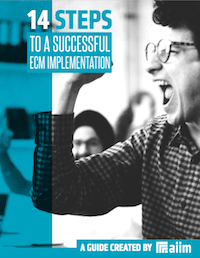The AIIM Blog
Keep your finger on the pulse of Intelligent Information Management with industry news, trends, and best practices.
Enterprise Content Management (ECM) | Enterprise Resource Planning (ERP)
AIIM recently conducted a survey of 387 individuals from organizations with 100+ staff to measure the benefits of connecting ERP and ECM. ERP has long reigned supreme as the all-encompassing enterprise application and is primarily focused on structured content. Meanwhile ECM has grown rapidly to become the repository of all the unstructured content and documents that accumulate outside of the purely transactional processes. Joining up these two major business engines has major potential as a common information interface for users across the business.
Share
Change Management | Enterprise Content Management (ECM)
Whether you are implementing a paperless office system, sustainable/green technologies, or other productivity changes, there are at least eight steps to the successful adoption of new technology.
Share

Making an ECM implementation successful requires planning and attention to detail. The best way to create the right solution is to identify organizational goals and priorities. Learn how to manage a successful implementation in our free guide.
Enterprise Content Management (ECM)
1. Business Assessment. Enterprise Content Management (ECM) should be implemented to help an organization achieve its business objectives and strategies. Recent industry studies indicate four primary drivers for ECM adoption: cost reduction, enhancing customer service, ensuring business continuity, and regulatory compliance. Organizations should do a thorough assessment of their needs in these key areas and identify the strategic imperatives that should be targeted by ECM. Return on the investment (ROI) provides proof of how ECM supports the organization’s business strategies. Success is identified by measuring business benefits.
Share
Data Management | Enterprise Content Management (ECM)
Share
Enterprise Content Management (ECM)
1. Make sure to include only high-level managers in the planning stages. Don’t let anyone who actually does the work anywhere near the process. They are “too busy” to be bothered. Senior managers know all of the step-by-step processes, of course, and they have lots of opinions on how these can be made more efficient. (Plus, one of them probably has a brother-in-law who sells ECM software.) 2. Do not appoint a project leader. Or, appoint several and let them fight it out. You can also appoint one, and make sure they don’t have any actual authority. These are all good. The point is to avoid leadership and accountability at any level.
Share